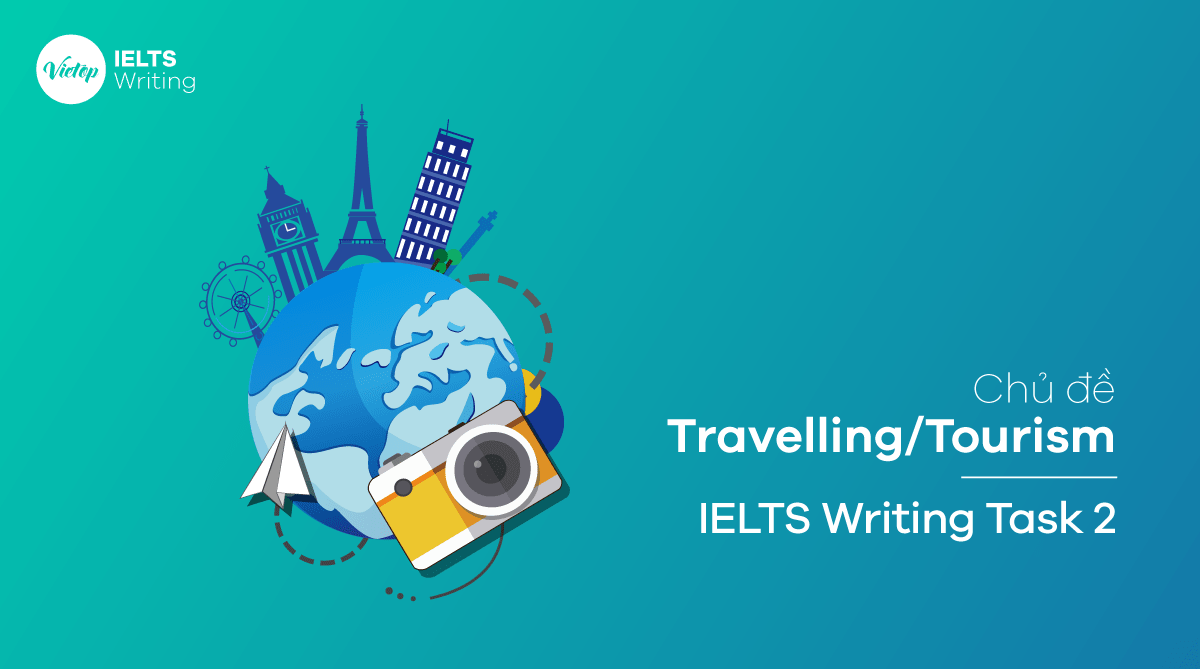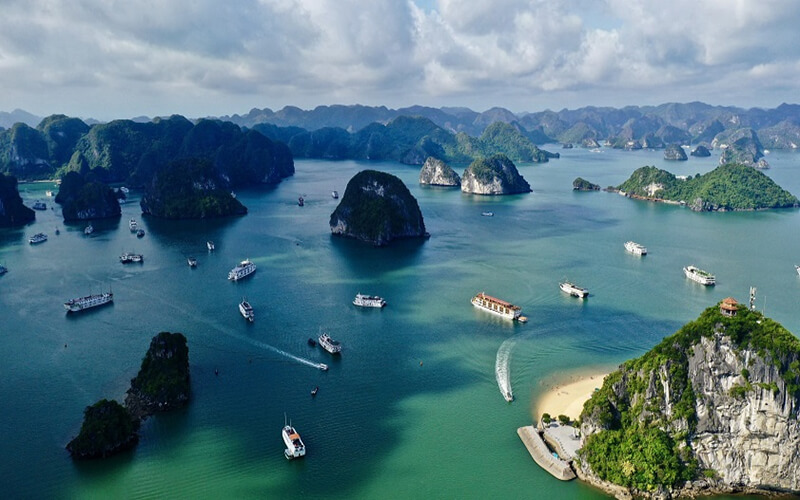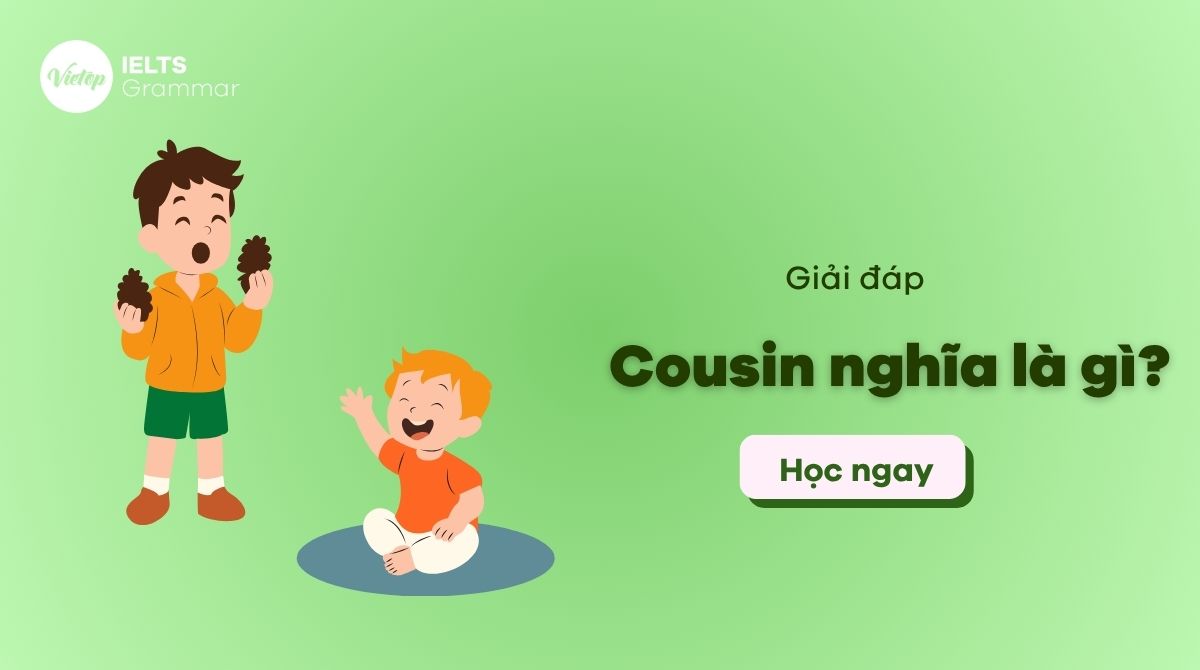Chủ đề Travel/Tourism là một trong những chủ đề phổ biến trong các đề thi IELTS Writing Task 2. Thường các bạn sẽ nghĩ chủ đề này dễ nhưng cũng khiến nhiều thí sinh mất điểm do không để ý một vài điểm nhỏ. Do đó trong bài viết này Vietop English sẽ tổng hợp cho bạn các từ vựng thường dùng ở chủ đề Travel/Tourism và bài mẫu ở phần thi Writing Task 2, mong rằng nó sẽ giúp ích được cho bạn hơn nhé!
Nếu bạn thích học online hãy tìm hiểu ngay về: Khóa học IELTS Online chỉ từ 3-5 bạn
A. Từ vựng Chủ đề Travel/ Tourism

- Hospitality (n): sự hiếu khách
- Indigenous people = the locals: người dân địa phương
- Heritage site: khu di sản
- Nightlife: cuộc sống về đêm
- Unexpected expenses: chi phí phát sinh
- Cost-effective (a): (mang tính) chi tiêu hiệu quả
- Tranquility: sự yên tĩnh
- Hustle and bustle: cuộc sống tấp nập
- Worth-living (a): đáng sống
- Rat race: cuộc sống xô bồ
- Culture shock: sốc văn hóa
- Stunning/ scenic/ breathtaking/ picturesque/ superb (a): (cảnh) đẹp tuyệt vời, ngộp thở, như tranh vẽ, tuyệt hảo
- Go sightseeing: đi ngắm cảnh
- Out of season >< peak time: mùa cao điểm
- Flock to (v): lũ lượt kéo nhau đến
- Tourist trap: địa điểm du lịch quá đông đúc và bóc lột khách du lịch
- Cuisine: nền ẩm thực
- Local specialty: đặc sản địa phương
- Green tourism = sustainable tourism = eco-tourism: du lịch sinh thái
- National park: vườn quốc gia
- Wildlife preserve: là vùng đất giúp bảo tồn các môi trường sống tự nhiên, nhằm phục vụ cho công tác bảo tồn, giáo dục và nghiên cứu
- Carbon footprint: dấu chân carbon
- Broaden one’s horizon: mở rộng chân trời
- Establish a relationship: thiết lập một mối quan hệ
- Native resident: người dân bản địa
- Interchange: trao đổi
- Take its toll on something/somebody: gây hại cho ai, cho cái gì
- Mass tourism: du lịch đại chúng / đại trà
- Popular tourist destinations = famous tourist attractions: những điểm đến du lịch phổ biến
- Cultural activities: những hoạt động văn hóa
- Customs: phong tục
- Environmental deterioration
- Remote areas
- Ethnic people: Người dân tộc thiểu số
- Integrate (v) into: hòa nhập với
- Cultural assimilation (n): sự đồng hóa về mặt văn hóa
- Holidaymaker: khách du lịch
Xem thêm:
Cách học bảng chữ cái tiếng Anh
Chủ đề Describe an important holiday in your country – IELTS Speaking Part 2
B. Ý tưởng về Chủ đề Travel/ Tourism
1. Mặt tích cực
- Tourism is a popular leisure activity: du lịch là một hoạt động giải trí
- Travelling abroad opens our minds and broadens our horizon: Du lịch mở mang đầu óc và kiến thức
- Travelers can learn to speak other languages: những người đi du lịch có thể học được ngôn ngữ mới.
- The tourist trade is vital for some economies. It creates employment in services like accommodation, transport and entertainment: Ngành du lịch quan trọng với 1 số nền kinh tế, du lịch tạo ra nhiều cơ hội việc làm như là cung cấp nơi ở, vận chuyển và giải trí.
- Tourism attracts investment from multi-national companies: Ngành du lịch thu hút đầu tư từ những công ty đa quốc gia.
Xem thêm: Top 10 kênh Youtube tự học IELTS 4 Kỹ năng dành cho bạn
2. Mặt tiêu cực
- Excessive building (roads, hotels etc.) destroys natural habitats and spoils the landscape: Việc xây dựng đừng xá và khách sạn quá mức phá hủy môi trường sống tự nhiên và những cảnh đẹp.
- The building of facilities and infrastructure can destroy the habitat of wild animals
- Tourism creates pollution and waste. It puts pressure on local resources such as food, water and energy. Du lịch gây ra ô nhiễm và rác thải. Nó tạo áp lực lên nguồn tài nguyên địa phương như là nguồn thực phẩm, nguồn nước và nguồn năng lượng.
- Prices of goods and services go up: Giá dịch vụ và hàng hóa tăng
- Local traditions may be lost: Truyền thống địa phương sẽ mất dần
- Traditional jobs and skills die out (e.g. farming, fishing). Local people are forced to work in the tourist industry: Nghề truyền thống sẽ dần mất đi. Người dân địa phương bị buộc phải làm việc trong ngành du lịch.
- Incidences of crimes, prostitution and antisocial activities like drugs, human trafficking and gambling, which affect the values of the indigenous society are increasing: Những rắc rối liên quan đến tội phạm, mại dâm và các hành vi chống đối xã hội khác như sử dụng thuốc kích thích, mua bán người và đánh bạc mà nó gây ảnh hưởng đến cộng đồng người dân địa phương đang dần tăng lên.
3. Tourism trong tương lai
- Government should implement strict legislations to protect natural environments and local cultures: Chính phủ nên ban hành những quy định nghiêm khắc để bảo vệ môi trường tự nhiên và văn hóa địa phương.
- Local businesses such as farms should be supported: Những hoạt động địa phương như chăn nuôi nên được hỗ trợ.
- Eco-tourism should be emphasized: Du lịch sinh thái nên được tập trung phát triển.
“Khóa học IELTS” tại Vietop ra sao? cùng tìm hiểu bí mật đạt điểm cao
C. Bài mẫu
Many developing countries are currently expanding their tourist industries. Why is this the case? Is it a positive or negative development?
Tourism in recent years has been booming on an unprecedented scale, with many developing countries considering it as a major income source. The main reason for this is the great revenue it generates, and I believe that it is a positive development in some countries that embrace sustainability, but a negative one in some others who are inclined towards mass tourism.
The major reason for the rapid growth of tourism is the great profits it might bring. Indeed, tourism has become one of the major players in international commerce, with many statistics indicating that the revenue it brings equals or even surpasses that of many industrial fields such as garment, food production or oil exports. In cases of developing countries where technology in industrial areas is somewhat inferior to developed ones, tourism is deemed instrumental in promoting economic well-being. Any country endowed with natural beauties and historic sites can take advantage of those precious sources to boost their economy.
Sustainable tourism, with all economic, social and environmental angles being thoroughly taken into consideration, is a welcome development. It helps generate great profits, it is a good and healthy form of entertainment for tourists, and it also provides jobs for inhabitants living in tourist destinations. Reality Tours and Travel in India is a great example of such a tourism paradigm. Travelers taking the tour are provided with not only personal solace but also valuable, thought-provoking experiences about the locals’ lives, and the profits of the tours eventually go to the development of the impoverished areas in Mumbai and Delhi. However, in some other developing countries where mass tourism prevails, this has become a disaster. Influxes of tourists flocking to one area in peak seasons, littering all over the place, intervening in the locals’ traditional values and damaging the environment have plagued the overall well-being of those countries. The Great Pyramid of Giza in Egypt, for example, has been reported to suffer from irreversible damage as a result of the enormous number of visitors coming there to see the site every year.
In conclusion, tourism has enjoyed increasing popularity in developing countries because it is a profitable economic sector. It can be a force for good if developed judiciously and sustainably, yet a catastrophe if it is out of control and tampers with the life and nature of the local areas.

Hơn 21.220+ học viên đã đạt chứng chỉ tiếng Anh quốc tế, tự tin giao tiếp và mở rộng cơ hội học tập – nghề nghiệp. Đăng ký ngay để không bỏ lỡ cơ hội!
- On an unprecedented scale: ở một quy mô chưa từng thấy
- revenue: nguồn thu, nguồn lợi
- sustainability: sự bền vững
- inclined towards: nghiên về
- mass tourism: du lịch đại trà
- international commerce: thương mại quốc tế
- surpass: vượt qua
- garment: ngành dệt may
- inferior to: trở nên thua kém
- instrumental in: rất quan trọng trong việc tạo nên
- endowed with: được ban tặng, được trời cho
- paradigm: mô hình
- personal solace: sự khuây khỏa cá nhân
- thought-provoking: khiến cho người ta suy nghĩ nhiều
- impoverished: nghèo khó, khó khăn
- prevail: áp đảo, chiếm ưu thế
- influxes (of): những dòng người lũ lượt
- flock: kéo đến với số lượng lớn
- plague: gây vấn đề, gây rắc rối
- irreversible damage: hư hại không thể phục hồi
- a force for good: một ảnh hưởng tích cực
- judiciously: một cách khôn ngoan
- catastrophe: thảm họa
- tamper with: phá hoại, làm hư hại

Xem thêm: Trọn bộ đề IELTS Writing Task 1 và IELTS Writing Task 2 qua từng năm
D. Bài tập
- Organized tour to remote areas and community is increasingly popular. Is it a positive or negative development for the local people and the environment?
- Tourism is an ever growing industry. What benefits do you think tourism brings to individuals and society?
- As a result of tourism and the increasing number of people travelling. There is an growing demand for more flights.- What problems does this have on the environment?- What measures could be taken to solve the problems?
Trên đây là những kiến thức chủ đề Travel/ Tourism – IELTS Writing Task 2 mà Vietop đã tổng hợp, hy vọng rằng nó sẽ giúp ích được cho bạn trong quá trình luyện thi IELTS và áp dụng trong cuộc sống hằng ngày.
Chúc bạn học tập tốt và thành công nhé!









